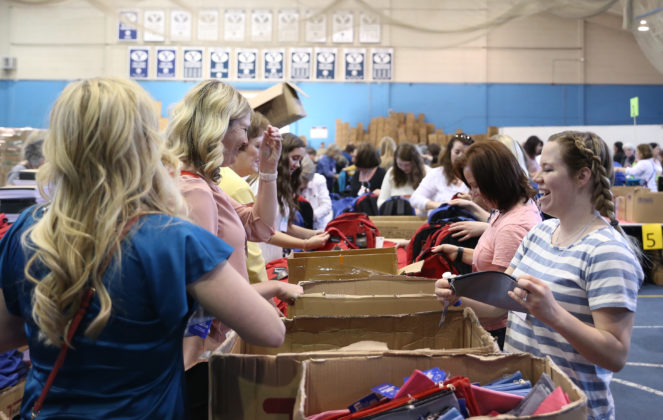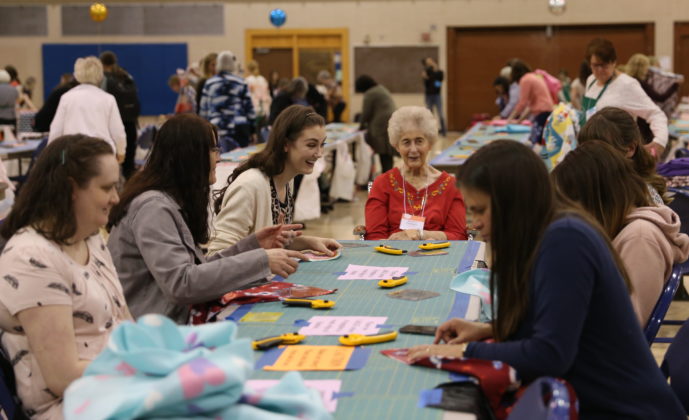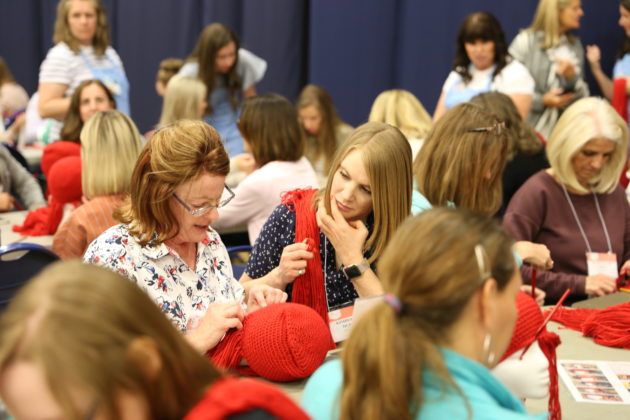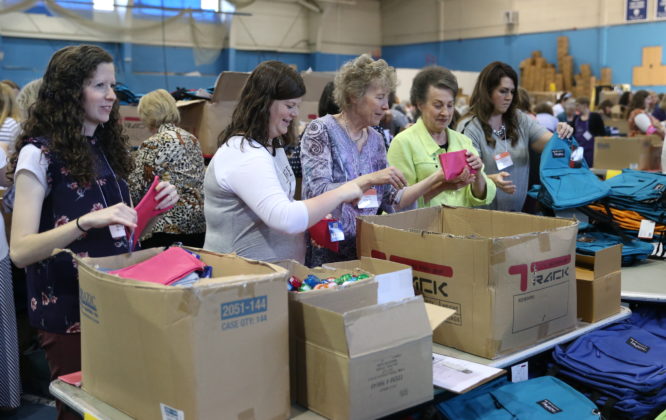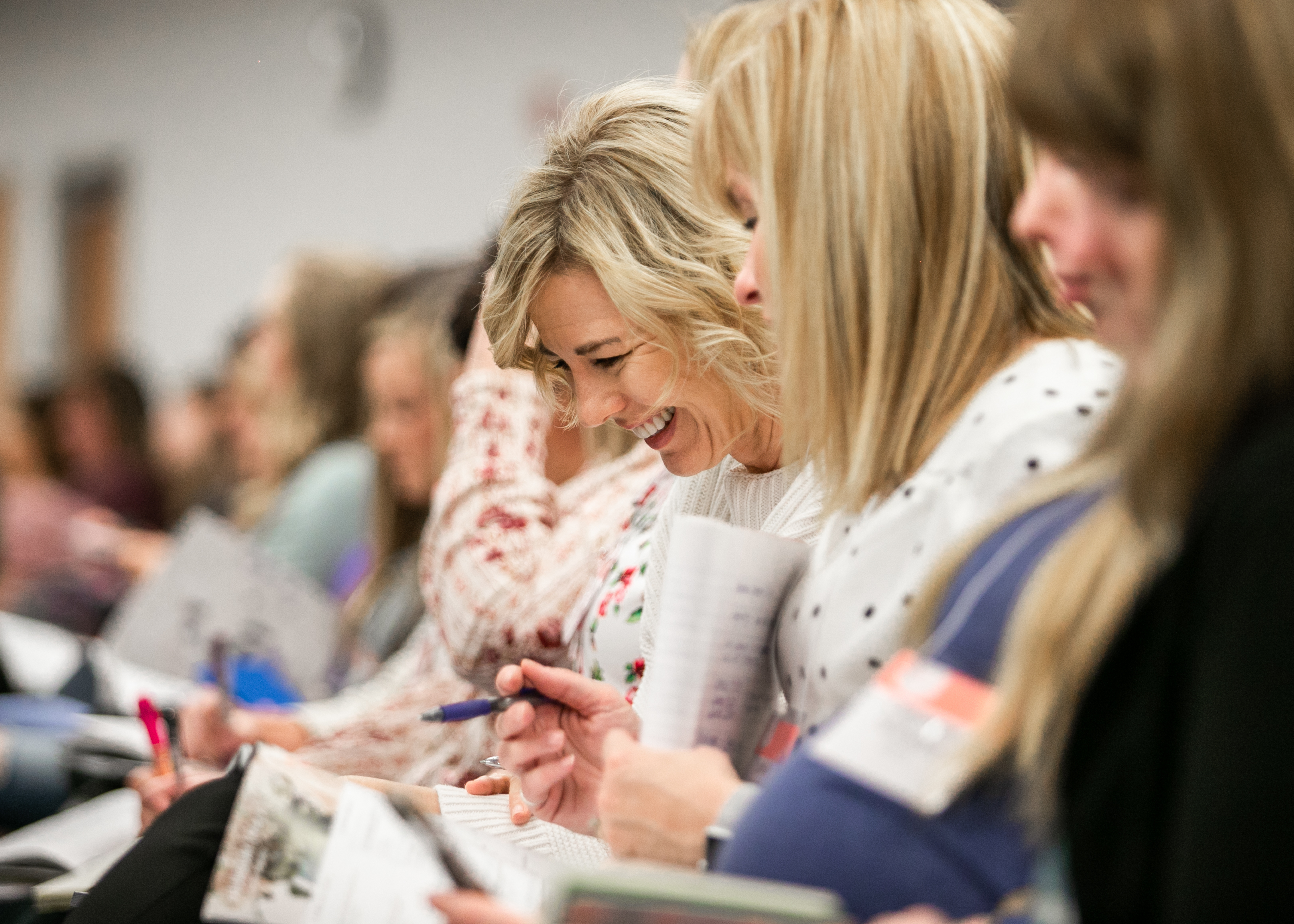
Patricia Huhem, a mother originally from Chile, said she’s been attending BYU Women’s Conference for about 26 years. As she raised her daughters, Natasha and Elisa Huhem, she dreamed of the day they would be old enough for all of them to attend together.
That dream finally came true for Huhem at the 2019 BYU Women’s Conference.
“Today’s the day,” she said while attending BYU Women’s Conference with Natasha and Elisa. “And I love (Women’s Conference) just because it’s my personal rejuvenation time to know that I’m doing what God wants me to do.”
The Huhems were just a few of the thousands of women who gathered on May 2 and 3 to hear General Auxiliaries, professionals and others speak on topics like revelation, family history and forgiveness.
This year’s conference also tackled tough topics like women and the priesthood and understanding the LGBTQ community. Further, the conference expanded to accommodate Spanish and Portuguese speakers and included service projects and a historic Sister to Sister event. The following are some highlights from our event coverage.
Women in Church history
During a May 2 session called “Women Making History in The Church of Jesus Christ of Latter-day Saints,” the Primary General Presidency spoke not only of the examples of women in Church history but also of how women today can make their own histories to leave as examples for generations to come.
Primary General President Joy D. Jones’ remarks were prerecorded, as she was in Washington, D.C. participating in the National Day of Prayer celebration at the White House.
Sister Cristina B. Franco, second counselor, presented names of women in Church history, such as Emma Smith, Eliza R. Snow and Mary Fielding Smith, and asked those attending the session to raise their hands if they knew who the women were.
“We believe that your names should, and will be, on that list,” Sister Franco said.
Sister Lisa L. Harkness, second counselor in the Primary general presidency, spoke about the importance of individuals knowing stories from their family histories.
“We bear testimony that just one of those stories could possibly help just one child, teenager or family member hold fast to their faith, avoid sin or get through a rough time in their lives,” she said.
Women and the priesthood
The Relief Society general presidency addressed questions about women and the priesthood during a May 2 session called “Endowed with Priesthood Power.”
Sister Jean B. Bingham, Relief Society General President, said that when a woman is endowed with priesthood power, “it is an infinite source that constantly renews and can never be exhausted.”
Sister Reyna I. Aburto, second counselor in the Relief Society general presidency, said every woman receives priesthood power as she participates in priesthood ordinances and keeps the related covenants.
“Each woman has access to priesthood power according to her covenants and her personal righteousness,” she said. “No one can take it from her, but no one can give priesthood power to her outside of the covenants and her individual striving to be true to those covenants.”
She also said it makes her sad when women say they don’t have the priesthood in their homes, because regardless of personal circumstances, and although women need those holding priesthood offices for blessings of health or comfort, “(women) are nevertheless themselves a source of priesthood power for their own homes.”
Sister Sharon Eubank, first counselor in the Relief Society general presidency, said that although people can already have a level of priesthood power simply through their goodness, that power is “greatly magnified” when they make and keep covenants.
She also emphasized that priesthood power is about other people, and cannot be used to control unrighteously.
“It can only be used to love,” she said. “This is the priesthood power we are called to receive: help others with their problems.”
Understanding the LGBTQ community
Deb Hutchins and Blake Fisher, both gay members of the Church, are involved in BYU’s LGBTQ outreach efforts. They spoke during a May 3 session called “Understanding the LGBTQ and SSA Community: Included in Our Circle of Love” about how Church members can show better love and understanding to their LGBTQ brothers and sisters.
Fisher said his sexuality has been compared to addiction, sickness, temptation and sin, and once he even heard someone say LGBTQ people should be loved just like murderers should be loved.
“I think you’d be surprised how often people compare the experience of sexuality with something that’s negative,” he said. “My rule is if you want to use a comparison, don’t.”
He also said when students come to his office, he often sees one of four mindsets: denying their faith, denying their sexuality, obsessing over their faith or obsessing over their sexuality.
However, “the way to find peace and joy is not in abandoning, it’s not in obsessing, but it’s in holding both (your faith and sexuality),” he said. “That is not easy. That creates a lot of tension between the two. But in that tension, I have come to know Jesus Christ.”
Closing session
Elder D. Todd Christofferson and his wife, Kathy, spoke at the closing session of BYU Women’s Conference on May 3.
Sister Christofferson spoke first, sharing a story of a testimony meeting where she said she could not think of anything “particularly remarkable” to say.
But though she felt embarrassed for not getting up, she said she found “that it isn’t in great miracles that a testimony is kept vibrant, but in the small day-to-day affirmations and directions we receive from heaven as we strive to come unto our Savior (and) keep His commandments.”
Elder Christofferson then spoke, identifying four kinds of help God offers out of care: commandments, grace, truth and gifts.
He invited the women in attendance to make God’s commandments a priority, saying, “That which truly matters most will occupy center stage in our lives, and that which doesn’t matter, doesn’t help or even hurts us, will fall away.”
Elder Christofferson also said Christ can give strength and forgiveness and eventually set all things right. However, “each of us is in charge of developing her or his own spiritual strength and stamina,” he said.
Joyce Haldeman, a conference attendee from Las Vegas, said Elder Christofferson’s messages are always uplifting, and they make the gospel simple and helpful to her.
She also said she was impressed throughout the entire conference with the speakers’ humility and preparation.
“I am so grateful to them that they take these assignments so seriously,” she said. “When you come to something like this and you feel like you get a sense of who the leaders are, it just makes you love the Church even more.”
Additional reporting done by Lauren Lethbridge and Colton Anderson.

